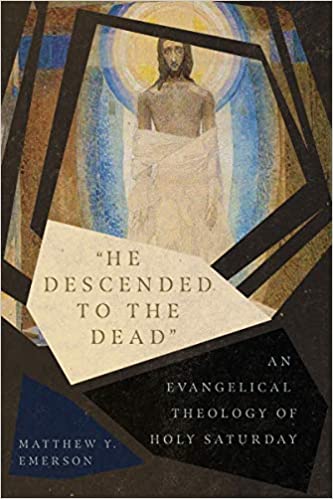A Brief Book Summary from Books at a Glance
By Mark Baker
About the Author
Matthew Y. Emerson (PhD, Southeastern Baptist Theological Seminary) is associate professor of religion at Oklahoma Baptist University. He has authored several books in the fields of biblical and historical theology including Christ and the New Creation: A Canonical Approach to the Theology of the New Testament.
Overview of the Book
We long for stories of redemption. And within those stories, we often see the theme of “descent,” whether it is Hercules descending into Hades, Gandalf into the depths of Moria, or Joyce Byers in the Upside Down. All of these stories are echoes of the greatest story ever told, a story that includes Christ’s descent into the dead. In our contemporary world where we frequently see death tolls in the headlines, Christ’s descent to the dead can become quite comforting. Jesus knows what it is like to die! Unfortunately, this doctrine has been abandoned in some theological circles, even for some evangelicals. This book seeks to retrieve the doctrine of Christ’s descent to the dead in order to encourage the church to rejoice in this doctrine.
Table of Contents
Part One: Biblical, Historical, and Theological Foundations
- Evangelicalism, Creedal Authority, and the Descent
- A Biblical Defense of the Descent
- A Historical Defense of the Descent
Part Two: The Descent and Christian Dogmatics
- Classical Trinitarianism and the Descent
- The Descent and the Doctrine of Creation
- Christological Anthropology in Descent Perspective
- The Descent and the Doctrine of Salvation
- The Descent and Ecclesiology
- The Descent and Eschatology
Part Three: The Descent and the Christian Life
- Pastoral and Practical Implications of the Descent
Summary
PART ONE: BIBLICAL, HISTORICAL, AND THEOLOGICAL FOUNDATIONS
Chapter 1: I Believe: Evangelicalism, Creedal Authority, and Descent
The phrase, “he descended to the dead” is perhaps the most controversial phrase of the Apostles’ Creed. Based on his exegesis of Proverbs 8:22–31 and 1 Peter 3:18–22, Wayne Grudem has argued for the removal of the phrase from the creed. Nevertheless, evangelicals should not follow Grudem’s lead for two reasons. First, although the above passages are important for the argument (and will be treated extensively later), Christ’s descent to the dead is attested through many more places throughout the storyline of Scripture. Second, although the authority of church tradition is a derivative authority from Scripture itself, Christ’s descent is a theological truth that has been universally held and cherished by the church for 1500 years, so it should not be discarded lightly.
[To continue reading this summary, please see below....]The remainder of this article is premium content. Become a member to continue reading.
Already have an account? Sign In
